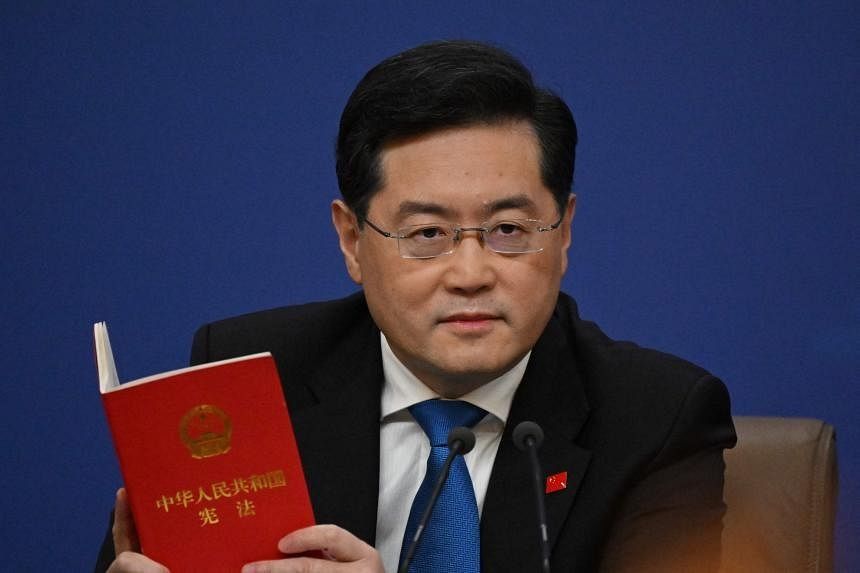BEIJING/JAKARTA, (Reuters) – Days before a conference of foreign ministers this month, China told host Indonesia it was switching its representative due to “unexpected circumstances”, prompting a scramble in Jakarta to resize the traditional gift of a shirt for attendees.
The planned recipient of the colorful batik top was Chinese foreign minister Qin Gang, who has not been seen in nearly a month and is set to miss at least one other important meeting, in South Africa, next week.
The government has since said Qin is off for unspecified health reasons, but with those and other comments excised from official transcripts and absent from state media, speculation has swirled in a country notoriously opaque about the private lives of its leaders.
The information vacuum has deepened suspicion among some diplomats and observers of China’s secretive decision-making at a time that it is seeking to reengage with the world after years of COVID-induced isolation.
“Qin’s disappearance does cast much uncertainty and confusion over the consistency, stability and credibility of Beijing’s decision-making,” said Yun Sun, director of the China Program at the Stimson Center in Washington.
“If a vice-national level leader can just disappear without much of an explanation, people find it difficult to trust and count on any Chinese leader or official and their positions.”
Asked at his ministry’s daily press conference on Thursday, about his status and when he would be returning to duties, spokesperson Mao Ning said: “I don’t have any information for your question.”
China said on Wednesday that Wang Yi – Qin’s slighter and shorter predecessor who wore the quickly adjusted shirt in Jakarta – will also fill in for China at a BRICS meeting in Johannesburg on July 24-25.
As well as the absence in Jakarta, details of which were relayed to Reuters on condition of anonymity by sources familiar with the planning, Qin’s vanishing from the diplomatic scene is raising scheduling questions for other engagements.
Britain has not been able to fix a date for its foreign minister to visit China, a trip slated to happen as soon as this month and seen as critical to patching up turbulent ties, sources familiar with the planning told Reuters.
Meanwhile, a visit by the European Union’s top diplomat, Josep Borrell, shelved at the last minute this month, is now not due to happen until the autumn, a senior EU official said.
It is not clear whether even then Borrell would meet Qin as initially planned, the official said.
A prolonged absence will “confuse other countries seeking to build channels of communication with China”, said Wen-Ti Sung, a political scientist at the Australian National University.
“Predictability and transparency are essential to regularizing dialogues and to trust-building, both of which are key ingredients to sustained cooperation.”
RISING STAR
Qin has been considered a rising star in China’s political firmament. The former aide to President Xi Jinping was appointed foreign minister in December after serving less than two years as ambassador to the United States.
Since taking up the foreign minister post, he has played a prominent role in steering rocky U.S.-China ties, meeting Secretary of State Antony Blinken in Beijing in June on the first visit to China by the top U.S. diplomat in five years.
But his last public engagement was a meeting with visiting Russian, Sri Lankan and Vietnamese officials on June 25.
Then he disappeared.
Aside from the brief comment about his health on July 11, his ministry has declined to offer any further information, rebuffing reporters’ questions at daily briefings and leaving out the exchanges, including the initial health comment, from its official transcript.
Comments on articles mentioning Qin shared on the WeChat messaging app have been disabled and a search by Reuters found no recent mentions of Qin in state media.
But there has been no shortage of interest.
Searches for “Qin Gang” on the Baidu search engine have increased 28-fold in the past week to more than 380,000 a day, according to platform data.
Qin’s absence has also been widely discussed in the diplomatic community, with some saying it is another example of China’s lack of transparency.
Amid a broad national security push in China in recent months, access to information including academic journals, corporate registries and economic indicators has been restricted, unnerving foreign governments and investors.
Some diplomats have even started to speculate on who may replace Qin, with three telling Reuters the ranking vice foreign minister, Ma Zhaoxu could be a candidate.
Ma, 59, who obtained a master’s degree from the London School of Economics and has served as ambassador to the United Nations, is not known to be an abrasive “wolf warrior” diplomat like Qin and Wang.
For now, there is little sign of any immediate clarity.
Qin’s successor as envoy to the United States, Xie Feng, was asked on Wednesday about Qin’s whereabouts by a moderator at the Aspen Security Conference.
“The foreign ministry spokesman has briefed the media about this. Thank you for your care,” Xie said, then chuckled along with the audience.

